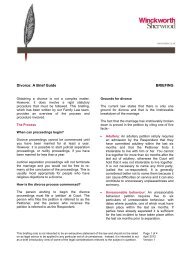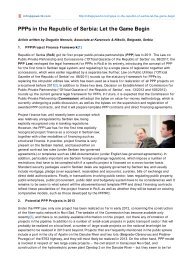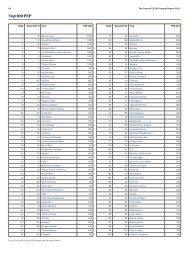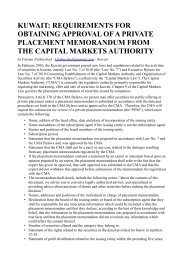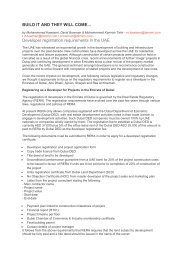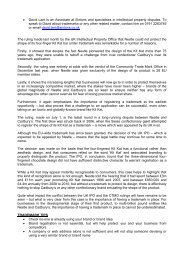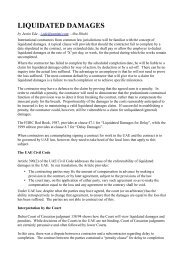Penalty clauses and liquidated damages: Traps for the ... - The Lawyer
Penalty clauses and liquidated damages: Traps for the ... - The Lawyer
Penalty clauses and liquidated damages: Traps for the ... - The Lawyer
Create successful ePaper yourself
Turn your PDF publications into a flip-book with our unique Google optimized e-Paper software.
equired <strong>the</strong> client to take a minimum of 500 consultancy days, was commercially justifiable, didnot amount to oppression <strong>and</strong> was negotiated freely - so was not a penalty.Take or pay <strong>clauses</strong> have generally been seen to give rise to a debt ra<strong>the</strong>r than a <strong>damages</strong> claim <strong>for</strong>breach of contract, <strong>and</strong> <strong>for</strong> this reason it was commonly believed that <strong>the</strong> rule against penalties(which applies to specified sums payable upon a breach of contract) would not apply.Burton J stated in <strong>the</strong> E-Nik judgment that <strong>the</strong> client's failure to take <strong>the</strong> minimum number of daysgave rise to a debt ra<strong>the</strong>r than a <strong>damages</strong> claim, but he did not elaborate on why <strong>the</strong> rule againstpenalties could still be applied. It remains to be seen whe<strong>the</strong>r <strong>the</strong> courts will clarify this point infuture <strong>and</strong> whe<strong>the</strong>r take or pay <strong>clauses</strong> will continue to be subject to <strong>the</strong> rule against penalties.Is it justified?Recently, <strong>the</strong> courts have shown a consistent reluctance to interfere with commercial contractssigned by parties of broadly similar bargaining power.<strong>The</strong> difficulty of arguing that a clause is a penalty was highlighted by <strong>the</strong> case of Azimut-BenettiSpA (Benetti Division) v Darrell Marcus Healey (2010), where <strong>the</strong> High Court found that a clauseentitling a luxury yacht-builder to retain 20% of <strong>the</strong> purchase price of <strong>the</strong> yacht upon termination<strong>for</strong> late payment, was 'commercially justifiable' in <strong>the</strong> circumstances <strong>and</strong> <strong>the</strong>re<strong>for</strong>e not a penalty.In Cavendish Square Holdings BV <strong>and</strong> ano<strong>the</strong>r company v Makdessi (2012), <strong>the</strong> buyer purchased60% of <strong>the</strong> holdings in <strong>the</strong> world's largest advertising <strong>and</strong> marketing communications group, <strong>and</strong>had an option to buy <strong>the</strong> remaining shares.Payment <strong>for</strong> <strong>the</strong> shares would be in three instalments, <strong>and</strong> if <strong>the</strong> seller breached certain restrictivecovenants this would cancel any outst<strong>and</strong>ing instalments <strong>and</strong> trigger <strong>the</strong> option <strong>for</strong> <strong>the</strong> buyer topurchase <strong>the</strong> remaining shares at a discounted price (to reflect <strong>the</strong> impact of <strong>the</strong> breach on <strong>the</strong>valuable goodwill of <strong>the</strong> target company).<strong>The</strong> seller breached <strong>the</strong> restrictive covenants, but argued that <strong>the</strong> buyer's right to cancel <strong>the</strong>outst<strong>and</strong>ing instalments <strong>and</strong> buy <strong>the</strong> remaining shares at a discounted rate amounted to a penalty.However, <strong>the</strong> High Court found that although <strong>the</strong> rule against penalties could apply under suchcircumstances, <strong>the</strong> terms were not penal <strong>for</strong> <strong>the</strong>se key reasons:• <strong>the</strong>re was a commercial justification <strong>for</strong> <strong>the</strong> terms• <strong>the</strong>y were not extravagant or oppressive• <strong>the</strong> main purpose of <strong>the</strong> terms was to provide a clean break to <strong>the</strong> commercial relationship<strong>and</strong> to adjust consideration <strong>for</strong> <strong>the</strong> remaining shares to reflect <strong>the</strong> loss in goodwill caused by<strong>the</strong> breach• <strong>the</strong> terms were negotiated heavily by experienced solicitorsTips on how to make it less likely that your LD is deemed to bea penaltyAlthough each case is decided on its facts, <strong>the</strong>re are a number of guiding principles to be taken intoaccount when drafting an LD clause, including:• avoid specifying sums payable upon breach which are so high that <strong>the</strong>y cannot be seen ascommercially justifiable or a genuine pre-estimate of loss• different types of breach should generally attract payment of different sums in order to beregarded in each case as a genuine pre-estimate of loss• if <strong>the</strong> primary obligation is payment of a particular sum, <strong>the</strong>n breach of this clause shouldnot usually give rise to a 'penalty' payment of a much higher sum



